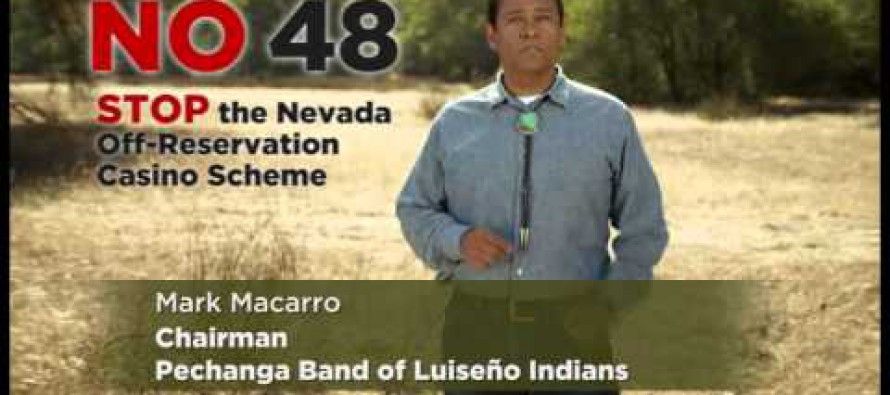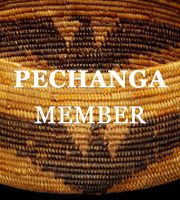Prop. 48: Pechanga opposes expansion of tribal gaming

 A Native American tribe is spending big bucks to limit the expansion of tribal gaming in California.
A Native American tribe is spending big bucks to limit the expansion of tribal gaming in California.
The Pechanga Band of Luiseño Indians recently contributed $1 million to oppose Proposition 48, a controversial compact that would pave the way for off-reservation casinos in California. In the tribe’s view, the state’s agreement with the North Fork Rancheria of Mono Indians would set a “bad precedent” and violate the spirit of Proposition 1A, the measure approved by voters in 2000 that authorized gaming on reservation land.
“Proposition 48 would allow a Nevada gambling company to use a rural tribe to build a casino on off-reservation land,” Mark Macarro, the tribal chairman of the Pechanga Band of Luiseno Indians, tells voters in a new ad. “48 would set a bad precedent — allowing off-reservation casinos.”
The tribe’s opposition to Prop. 48 is notable in that it has no vested financial interest in the outcome. Tribes with nearby casinos commonly use ballot measures and legislative approval of compacts as another front in their battle for the $7 billion tribal gaming market. In this case, Pechanga’s popular resort and casino in Temecula would be unaffected by the North Fork’s plans to build a casino in the Central Valley.
Its opposition to Prop. 48 seems motivated by an interest in preserving voter support for a system that has allowed the tribes to lift themselves out of poverty.
Referendum of controversial North Fork compact
In 2013, the Legislature narrowly approved Assembly Bill 277, a gaming compact that authorized the North Fork Rancheria of Mono Indians to build and operate a casino with up to 2,000-slot machines. The 305-acre site is conveniently located off Highway 99 north of Fresno — nearly 40 miles away from the North Fork reservation.
That location would give the North Fork tribe a competitive advantage over the Table Mountain Rancheria tribe, which “played by the rules” and built a smaller casino on its reservation lands.
“Years ago, California Indian Tribes asked voters to approve limited casino gaming on Indian reservation land,” opponents of Prop. 48 write in their ballot argument. “While most tribes played by the rules, building on their original reservation land and respecting the voters’ wishes, other tribes are looking to break these rules and build casino projects in urban areas across California.”
Last week, the Table Mountain Rancheria, along with Pechanga, contributed $1 million to the No on 48 campaign, according to Capitol Weekly. In all, Table Mountain Rancheria has spent more than $10 million to oppose Prop. 48.
Prop. 48 bankrolled by Station Casinos
The North Fork tribe says that the land located off Highway 99 was associated with the tribe centuries ago.
“We’re getting back to the historical land that served as a reservation for our tribe in the 1850s,” Charles Banks-Altekruse, a spokesman for the tribe, told the Associated Press.
In addition to its controversial site, the compact would exempt the project from the state’s environmental regulations and benefit its Las Vegas casino operator, Station Casinos. According to the Los Angeles Times, the Las Vegas-based casino company would “reap 30 percent of the profit.”
Unsurprisingly, Station Casinos has bankrolled the “Yes on 48” campaign. After the North Fork tribe, Station Casinos is the biggest contributor to the Yes on 48 campaign. According to state campaign finance disclosure reports, the Las Vegas-based casino giant has spent $375,000 to convince voters to approve the compact.
“Prop. 48 is not about Indian gaming,” Macarro said in a statement to the Press-Enterprise. “It is about a Las Vegas casino corporation making an end run to locate a casino in an urban area.”
Prop. 48: “Transforming California into Nevada”
Station Casinos’ support for the measure validates criticism that the North Fork compact could pave the way for Nevada-style gaming in California.
“Now, the North Fork tribe aims to change the face of tribal gaming, effectively transforming California into Nevada, where casino gambling is permitted practically anywhere and everywhere,” the Orange County Register wrote in its editorial against Prop. 48. “If that is what is to become of California, the issue should be put clearly before the state’s electorate and not by a ballot measure that does not inform voters that they are being asked, effectively, to ratify the precedent of off-reservation tribal casinos.”
If approved, the compact would provide the state with a one-time payment of between $16 million to $35 million, followed by $10 million annually over the next 20 years. The compact also requires the North Fork tribe to contribute less than 4 percent of slot revenues to the Wiyot Tribe, which has agreed not to build a casino on its nearby land.
Prop 48: Ballot Summary
A “Yes” vote approves, and a “No” vote rejects, tribal gaming compacts between the state and the North Fork Rancheria of Mono Indians and the Wiyot Tribe. Fiscal Impact: One-time payments ($16 million to $35 million) and for 20 years annual payments ($10 million) from Indian tribes to state and local governments to address costs related to the operation of a new casino.
No on 48 ad: “Honoring the Trust”
Related Articles
VIDEO: Republicans can be environmentalists, too
In a conversation with CalWatchdog.com Editor Brian Calle, San Diego Mayor Kevin Faulconer discusses the importance of preserving the environment
CA Democrats challenge Lt. Governor Newsom on gun control
Seeking to bolster his early-bird campaign for governor, Lt. Gov. Gavin Newsom forged ahead with a controversial ballot initiative
Fight escalates over federal funds for CA bullet train
The battle between California and the Trump administration over $3.4 billion in federal funding that was committed nearly a decade





